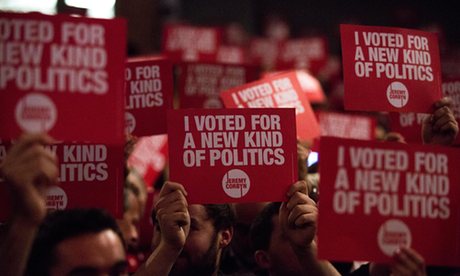There has been talk of a draft Momentum constitution being presented to the members before December 31. Obviously it is urgently needed if members are going to debate it and elect delegates to agree or change it. Allies of Jon Lansman have been coming out with proposals which lean heavily on the awful ‘A transparent structure that involves all Momentum members and groups’, which we discussed here.
Our approach is very different. We want thoroughgoing democracy, political clarity and an orientation that puts transforming Labour into a genuine socialist party at the heart of Momentum work. Membership should be open to all who accept this perspective. We see no need for Momentum to mimic the Labour Party or student unions with affiliations, liberation groups and special quotas. Comrades should have the right to establish factions, platforms, etc, but it is the national conference that should exercise sovereignty.
Labour Party Marxists proposes the following draft constitution as our contribution to what is a vital discussion. It is brief, simple, and democratically transparent on the rights and duties of members and their leadership. We believe that active, self-activating branches should constitute the foundation of Momentum.
1. Aims
1:1 Momentum exists to build on the energy and enthusiasm of the ‘Jeremy Corbyn for Labour Leader’ campaign, to increase participatory democracy, solidarity, and grassroots power. We want to transform the Labour Party into a real party of labour. The fundamental change we work for is the winning of a socialist society to replace the existing system of capitalism. Our end goal is a world based on the principle ‘From each according to their abilities; to each according to their needs’.
2. Organisation
2:1 Momentum organises on the basis of individual membership and the most thorough-going democracy. Decisions in Momentum meetings are taken by a simple majority of members voting (excluding abstentions). All officers and delegates on all levels can be recalled by a simple majority of the body that elected them (for example, a conference, the National Committee or a branch). Draft agendas must be published well in advance of any Momentum meeting; minutes must be published as soon as possible afterwards.
2:2 As a general principle, we organise on the basis of the part being subordinate to the whole. The conference is the highest decision-making body and elects the National Committee, which oversees the branches and any national groups and structures and elects a Steering Committee.
2:3 Members have the right to submit their views to higher committees up to the national Momentum leadership for discussion. In the spirit of the radical democracy that motivates our whole organisation, members may publicly oppose decisions of higher committees, as long this opposition does not disrupt specific concrete actions.
2:4 Momentum members have the right to form factions, platforms, tendencies, special interest groups/networks with a view to changing the organisation’s policy or its leadership.
3. Structure
3:1 Momentum membership is open to everybody who:
– supports the objectives and aims of Momentum, and
– is not currently a supporter of any organisation that stands candidates against the Labour Party.
3:2 The basic organisational elements of Momentum are the branches, which should meet at least monthly and, within their sphere of operation, exercise a wide degree of autonomy.
3:3 Conference is the highest decision-making body of Momentum. Conference should normally be held every year and the date and conference arrangements should be announced by the National Committee at least three months in advance. The NC is ultimately responsible for conference arrangements and how participants are elected.
Extraordinary conferences can be called by a majority decision of the National Committee, by a third of Momentum’s branches, or by a third of the national membership. If such a demand arises, the NC is obliged to convene an extraordinary conference. It should be held within three months.
3:4 Conference elects the National Committee and decides on its size. Between conferences the NC represents Momentum and is empowered to issue statements on behalf of the organisation, launch campaigns, etc. To facilitate its work and the effectiveness of the organisation, the NC is empowered to form other committees – organisational, political, editorial, regional, etc. The NC elects a Steering Committee and decides on its size. The SC is accountable to and recallable by the NC.
3:5 The National Committee controls and administers the national database and the income from membership dues. At least 30 percent of the income is distributed back to the branches, in proportion to the size of the local membership. In addition, branches are able to raise their own funds.
4. Discipline
4:1 All members of Momentum have to abide by the rules of Momentum and conduct themselves in a disciplined and comradely way. This does not imply that people cannot use harsh language or express themselves in angry tones when debating political differences. Our comrades are political people, who hold strong political opinions and may have sharp observations to make on the ideas of others. Examples of basic breaches of discipline in Momentum would be: the refusal to pay dues because of political differences; disrupting or sabotaging an action agreed by a majority of members; threatening or using violence; behaving in a way that brings discredit to Momentum.
4:2 A comrade’s level of political experience and familiarity with the culture of our organisation should always be taken into account when disciplinary measures are mooted.
4:3 Every member of Momentum who is subject to disciplinary procedures has the right to appeal to higher bodies of Momentum, up to and including the conference

